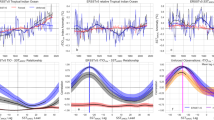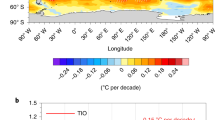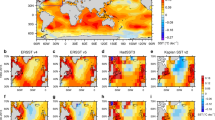Abstract
A salient feature of anthropogenic climate change is the enhanced warming of the tropical Indian Ocean (TIO) relative to the tropics. Recent studies show that this warming can remotely modulate the Atlantic meridional overturning circulation (AMOC). Motivated by these results, we systematically study the sensitivity of the AMOC and Atlantic climate to changes in TIO temperature using the latest coupled climate model from the Institut Pierre Simon Laplace (IPSL-CM6A-LR). Ensemble experiments nudging the TIO surface temperatures by − 2 °C, − 1 °C, + 1 °C, and + 2 °C are conducted. Within a few years after the forcing is imposed, different atmospheric teleconnections begin to drive the AMOC “fast” and “slow” responses, yielding after 150 years an AMOC equilibrium sensitivity of about + 9.4 Sv per 1 °C of relative TIO warming. A water mass transformation analysis shows that the fast response to TIO warming (on decadal timescales) is largely driven by surface cooling in the Labrador Sea caused by an induced positive North Atlantic Oscillation (NAO)-like mean pattern. By contrast, the slow response (on multi-decadal to centennial timescales) is driven by the gradual advection of positive salinity anomalies from the tropical Atlantic, which predominantly affect the Nordic Seas. The response is non-linear in that a TIO warming strengthens the AMOC through increase in Labrador Sea deep water formation, while a TIO cooling slows down the AMOC via sea ice expansion over the Nordic Seas deep-water formation region, ultimately leading to the AMOC shut-down in the − 2 °C-TIO experiment. These results help understand the role of interbasin connections and AMOC drivers in a warming climate.











Similar content being viewed by others
References
Alley RB, Marotzke J, Nordhaus WD, Overpeck JT, Peteet DM, Pielke RA, Pierrehumbert RT, Rhines PB, Stocker TF, Talley LD, Wallace JM (2003) Abrupt climate change. Science 299(5615):2005–2010. https://doi.org/10.1126/science.1081056
Aumont O, Ethé C, Tagliabue A, Bopp L, Gehlen M (2015) PISCES-v2: an ocean biogeochemical model for carbon and ecosystem studies. Geophys Mod Dev 8:2465–2513. https://doi.org/10.5194/gmd-8-2465-2015
Bader J, Latif M (2003) The impact of decadal-scale Indian Ocean sea surface temperature anomalies on Sahelian rainfall and the North Atlantic Oscillation. Geophys Res Lett. https://doi.org/10.1029/2003GL018426
Bader J, Latif M (2005) North Atlantic Oscillation response to anomalous Indian Ocean SST in a coupled GCM. J Clim 18(24):5382–5389. https://doi.org/10.1175/JCLI3577.1
Baker HS, Woollings T, Forest CE, Allen MR (2019) The linear sensitivity of the North Atlantic Oscillation and eddy-driven jet to SSTs. J Clim 32(19):6491–6511. https://doi.org/10.1175/JCLI-D-19-0038.1
Biastoch A, Durgadoo JV, Morrison AK, Van Sebille E, Weijer W, Griffies SM (2015) Atlantic multi-decadal oscillation covaries with Agulhas leakage. Nat Commun 6(1):1–7. https://doi.org/10.1038/ncomms10082
Boucher O, Servonnat J, Albright AL, Aumont O, Balkanski Y et al (2020) Presentation and evaluation of the IPSL-CM6A-LR climate model. J Adv Model Earth Syst. https://doi.org/10.1029/2019MS002010
Buckley MW, Marshall J (2016) Observations, inferences, and mechanisms of the Atlantic Meridional Overturning Circulation: a review. Rev Geophys 54(1):5–63. https://doi.org/10.1002/2015RG000493
Byrne MP, Pendergrass AG, Rapp AD, Wodzicki KR (2018) Response of the intertropical convergence zone to climate change: location, width, and strength. Curr Clim Change Rep 4(4):355–370. https://doi.org/10.1007/s40641-018-0110-5
Caesar L, McCarthy GD, Thornalley DJR, Cahill N, Rahmstorf S (2021) Current Atlantic Meridional Overturning Circulation weakest in last millennium. Nat Geosci. https://doi.org/10.1038/s41561-021-00699-z
Caian M, Koenigk T, Döscher R, Devasthale A (2018) An interannual link between Arctic sea-ice cover and the North Atlantic Oscillation. Clim Dyn 50(1):423–441. https://doi.org/10.1007/s00382-017-3618-9
Cheng W, Chiang JC, Zhang D (2013) Atlantic meridional overturning circulation (AMOC) in CMIP5 models: RCP and historical simulations. J Clim 26(18):7187–7197. https://doi.org/10.1175/JCLI-D-12-00496.1
Clement AC, Peterson LC (2008) Mechanisms of abrupt climate change of the last glacial period. Rev Geophys. https://doi.org/10.1029/2006RG000204
de la Cámara A, Lott F (2015) A stochastic parameterization of the gravity waves emitted by fronts and jets. Geophys Res Lett 42:2071–2078. https://doi.org/10.1002/GL063298
de la Cámara A, Lott F, Abalos M (2016) Climatology of the middle atmosphere in LMDz: impact of source-related parameterizations of gravity wave drag. J Adv Model Earth Syst 8(4):1507–1525. https://doi.org/10.1002/2016MS000753
Delworth TL, Zeng F (2016) The impact of the North Atlantic Oscillation on climate through its influence on the Atlantic meridional overturning circulation. J Clim 29(3):941–962. https://doi.org/10.1175/JCLI-D-15-0396.1
Dong L, Zhou T (2014) The Indian Ocean sea surface temperature warming simulated by CMIP5 models during the twentieth century: competing forcing roles of GHGs and anthropogenic aerosols. J Clim 27(9):3348–3362. https://doi.org/10.1175/JCLI-D-13-00396.1
Du Y, Xie SP (2008) Role of atmospheric adjustments in the tropical Indian Ocean warming during the 20th century in climate models. Geophys Res Lett. https://doi.org/10.1029/2008GL033631
Durack PJ, Wijffels SE (2010) Fifty-year trends in global ocean salinities and their relationship to broad-scale warming. J Clim 23(16):4342–4362. https://doi.org/10.1175/2010JCLI3377.1
Durack PJ, Wijffels SE, Matear RJ (2012) Ocean salinities reveal strong global water cycle intensification during 1950 to 2000. Science 336(6080):455–458. https://doi.org/10.1126/science.1212222
Escudier R, Mignot J, Swingedouw D (2013) A 20-year coupled ocean-sea ice-atmosphere variability mode in the North Atlantic in an AOGCM. Clim Dyn 40(3–4):619–636. https://doi.org/10.1007/s00382-012-1402-4
Estella-Perez V, Mignot J, Guilyardi E, Swingedouw D, Reverdin G (2020) Advances in reconstructing the AMOC using sea surface observations of salinity. Clim Dyn. https://doi.org/10.1007/s00382-020-05304-4
Frierson DMW, Hwang Y-T, Fučkar NS, Seager R, Kang SM, Donohoe A et al (2013) Contribution of ocean overturning circulation to tropical rainfall peak in the Northern Hemisphere. Nat Geosci 6(11):940–944. https://doi.org/10.1038/ngeo1987
Garcia-Quintana Y, Courtois P, Hu X, Pennelly C, Kieke D, Myers PG (2019) Sensitivity of Labrador Sea Water formation to changes in model resolution, atmospheric forcing, and fresh water input. J Geophys Res Oceans 124(3):2126–2152. https://doi.org/10.1029/2018JC014459
Gastineau G, Treut HL, Li L (2008) Hadley circulation changes under global warming conditions indicated by coupled climate models. Tellus A Dyn Meteorol Oceanogr 60(5):863–884. https://doi.org/10.1111/j.1600-0870.2008.00344.x
Gill AE (1980) Some simple solutions for heat-induced tropical circulation. Q J R Meteorol Soc 106(449):447–462. https://doi.org/10.1002/qj.49710644905
Goelzer H, Mignot J, Levermann A, Rahmstorf S (2006) Tropical versus high latitude fresh water influence on the Atlantic circulation. Clim Dyn 27(7–8):715–725. https://doi.org/10.1007/s00382-006-0161-5
Grodsky SA, Carton JA, Bryan FO (2014) A curious local surface salinity maximum in the northwestern tropical Atlantic. J Geophys Res Oceans 119:1–12. https://doi.org/10.1002/2013JC009450
Hoerling MP, Hurrell JW, Xu T (2001) Tropical origins for recent North Atlantic climate change. Science 292(5514):90–92. https://doi.org/10.1126/science.1058582
Hoerling MP, Hurrell JW, Xu T, Bates GT, Phillips AS (2004) Twentieth-century North Atlantic climate change. Part II: understanding the effect of Indian Ocean warming. Clim Dyn 23(3–4):391–405. https://doi.org/10.1007/s00382-004-0433-x
Hourdin F, Rio C, Grandpeix J-Y, Madeleine J-B, Cheruy F, Rochetin N, Ghattas J (2020) LMDZ6: the improved atmospheric component of the IPSL coupled model. J Adv Model Earth Syst. https://doi.org/10.1029/2019MS001988
Hu S, Fedorov AV (2019) Indian Ocean warming can strengthen the Atlantic meridional overturning circulation. Nat Clim Change 9(10):747–751. https://doi.org/10.1038/s41558-019-0566-x
Hu S, Fedorov AV (2020) Indian Ocean warming as a driver of the North Atlantic warming hole. Nat Commun. https://doi.org/10.1038/s41467-020-18522-5
Hu A, Meehl GA, Han W, Yin J (2011) Effect of the potential melting of the Greenland Ice Sheet on the Meridional Overturning Circulation and global climate in the future. Deep Sea Res Part II 58(17–18):1914–1926. https://doi.org/10.1016/j.dsr2.2010.10.069
Hurrell JW (1995) Decadal trends in the North Atlantic Oscillation: regional temperatures and precipitation. Science 269(5224):676–679. https://doi.org/10.1126/science.269.5224.676
Ihara C, Kushnir Y, Cane MA (2008) Warming trend of the Indian Ocean SST and Indian Ocean dipole from 1880 to 2004. J Clim 21(10):2035–2046. https://doi.org/10.1175/2007JCLI1945.1
Intergovernmental Panel on Climate Change (IPCC) (2013) In: Stocker TF et al (eds) Climate change 2013: the physical science basis. Contribution of Working Group I to the Fifth Assessment Report of the Intergovernmental Panel on Climate Change. Cambridge University Press, Cambridge, p 1535
Jackson L, Vellinga M (2013) Multidecadal to centennial variability of the AMOC: HadCM3 and a perturbed physics ensemble. J Clim 26(7):2390–2407. https://doi.org/10.1175/JCLI-D-11-00601.1
Jackson L, Wood RA (2020) Fingerprints for early detection of changes in the AMOC. J Clim 33(16):7027–7044. https://doi.org/10.1175/JCLI-D-20-0034.1
Jackson LC, Kahana R, Graham T, Ringer MA, Woollings T, Mecking JV, Wood RA (2015) Global and European climate impacts of a slowdown of the AMOC in a high resolution GCM. Clim Dyn 45(11–12):3299–3316. https://doi.org/10.1007/s00382-015-2540-2
Jackson LC, Peterson KA, Roberts CD, Wood RA (2016) Recent slowing of Atlantic overturning circulation as a recovery from earlier strengthening. Nat Geosci 9(7):518–522. https://doi.org/10.1038/ngeo2715
Jiang W, Gastineau G, Codron F (2021) Multi-centennial variability driven by salinity exchanges between the Atlantic and the Arctic Ocean in a coupled climate model. J Adv Model Earth Syst. https://doi.org/10.1029/2020MS002366
Kieke D, Rhein M, Stramma L, Smethie WM, LeBel DA, Zenk W (2006) Changes in the CFC inventories and formation rates of Upper Labrador Sea Water, 1997–2001. J Phys Oceanogr 36(1):64–86. https://doi.org/10.1175/JPO2814.1
Krinner G, Viovy N, de Noblet-Ducoudre N, Ogee J, Polcher J, Friedlingstein P, Ciais P, Sitch S, Prentice IC (2005) A dynamic global vegetation model for studies of the coupled atmosphere-biosphere system. Global Biogeogr Cycles 19(1):1015. https://doi.org/10.1029/2003GB002199
Latif M, Roeckner E, Mikolajewicz U, Voss R (2000) Tropical stabilization of the thermohaline circulation in a greenhouse warming simulation. J Clim 13(11):1809–1813. https://doi.org/10.1175/1520-0442(2000)013%3c1809:L%3e2.0.CO;2
Lee S, Gong T, Johnson N, Feldstein SB, Pollard D (2011) On the possible link between tropical convection and the Northern Hemisphere Arctic surface air temperature change between 1958 and 2001. J Clim 24(16):4350–4367. https://doi.org/10.1175/2011JCLI4003.1
Liu W, Fedorov AV (2019) Global impacts of Arctic sea ice loss mediated by the Atlantic meridional overturning circulation. Geophys Res Lett 46(2):944–952. https://doi.org/10.1029/2018GL080602
Liu W, Xie SP, Liu Z, Zhu J (2017) Overlooked possibility of a collapsed Atlantic Meridional Overturning Circulation in warming climate. Sci Adv 3(1):e1601666. https://doi.org/10.1126/sciadv.1601666
Liu W, Fedorov A, Sévellec F (2019) The mechanisms of the Atlantic meridional overturning circulation slowdown induced by Arctic sea ice decline. J Clim 32(4):977–996. https://doi.org/10.1175/JCLI-D-18-0231.1
Liu W, Fedorov AV, Xie SP, Hu S (2020) Climate impacts of a weakened Atlantic Meridional Overturning Circulation in a warming climate. Sci Adv 6(26):eaaz876. https://doi.org/10.1126/sciadv.aaz4876
Lott F, Guez L (2013) A stochastic parameterization of the gravity waves due to convection and its impact on the Equatorial stratosphere. J Geophys Res 118:8897–8909. https://doi.org/10.1002/jgrd.50705
Madec G, Bourdalle-Badie R, Bouttier P, Bricaud C, Bruciaferri D, Calvert D, Vancoppenolle M (2017) NEMO ocean engine (version v3.6). Notes Du Pôle De Modélisation De L’institut Pierre-Simon Laplace (IPSL). https://doi.org/10.5281/zenodo.1472492
Marshall J, Donohoe A, Ferreira D, McGee D (2014) The ocean’s role in setting the mean position of the Inter-Tropical Convergence Zone. Clim Dyn 42(7–8):1967–1979. https://doi.org/10.1007/s00382-013-1767-z
Matsuno T (1966) Quasi-geostrophic motions in the equatorial area. J Meteorol Soc Japan. Ser. II 44(1):25–43. https://doi.org/10.2151/jmsj1965.44.1_25
Menary MB, Park W, Lohmann K, Vellinga M, Palmer MD, Latif M, Jungclaus JH (2012) A multimodel comparison of centennial Atlantic meridional overturning circulation variability. Clim Dyn 38(11–12):2377–2388. https://doi.org/10.1007/s00382-011-1172-4
Mignot J, Frankignoul C (2010) Local and remote impacts of a tropical Atlantic salinity anomaly. Clim Dyn 35(7–8):1133–1147. https://doi.org/10.1007/s00382-009-0621-9
Mignot J, de Boyer Montégut C, Lazar A, Cravatte S (2007) Control of salinity on the mixed layer depth in the world ocean: 2. Tropical areas. J Geophys Res Oceans 112:C10. https://doi.org/10.1029/2006JC003954
Moreno-Chamarro E, Marshall J, Delworth TL (2020) Linking ITCZ migrations to the AMOC and North Atlantic/Pacific SST decadal variability. J Clim 33(3):893–905. https://doi.org/10.1175/JCLI-D-19-0258.1
Msadek R, Frankignoul C (2009) Atlantic multidecadal oceanic variability and its influence on the atmosphere in a climate model. Clim Dyn 33(1):45–62. https://doi.org/10.1007/s00382-008-0452-0
Olonscheck D, Mauritsen T, Notz D (2019) Arctic sea-ice variability is primarily driven by atmospheric temperature fluctuations. Nat Geosci 12(6):430–434. https://doi.org/10.1038/s41561-019-0363-1
Ortega P, Mignot J, Swingedouw D, Sévellec F, Guilyardi E (2015) Reconciling two alternative mechanisms behind bi-decadal variability in the North Atlantic. Prog Oceanogr 137:237–249. https://doi.org/10.1016/j.pocean.2015.06.009
Ortega P, Robson J, Sutton RT, Andrews MB (2017) Mechanisms of decadal variability in the Labrador Sea and the wider North Atlantic in a high-resolution climate model. Clim Dyn 49(7–8):2625–2647. https://doi.org/10.1007/s00382-016-3467-y
Park HS, Lee S, Son SW, Feldstein SB, Kosaka Y (2015) The impact of poleward moisture and sensible heat flux on Arctic winter sea ice variability. J Clim 28(13):5030–5040. https://doi.org/10.1175/JCLI-D-15-0074.1
Rahmstorf S (2002) Ocean circulation and climate during the past 120,000 years. Nature 419(6903):207–214. https://doi.org/10.1038/nature01090
Rahmstorf S, Box JE, Feulner G, Mann ME, Robinson A, Rutherford S, Schaffernicht EJ (2015) Exceptional twentieth-century slowdown in Atlantic Ocean overturning circulation. Nat Clim Change 5(5):475–480. https://doi.org/10.1038/nclimate2554
Rao SA, Dhakate AR, Saha SK, Mahapatra S, Chaudhari HS, Pokhrel S, Sahu SK (2012) Why is Indian Ocean warming consistently? Clim Change 110(3):709–719. https://doi.org/10.1007/s10584-011-0121-x
Richter I, Xie SP (2010) Moisture transport from the Atlantic to the Pacific basin and its response to North Atlantic cooling and global warming. Clim Dyn 35(2–3):551–566. https://doi.org/10.1007/s00382-009-0708-3
Rousset C, Vancoppenolle M, Madec G, Fichefet T, Flavoni S, Barthélemy A, Benshila R, Chanut J, Levy C, Masson S, Vivier F (2015) The Louvain-La-Neuve sea ice model LIM3.6: global and regional capabilities. Geophys Mod Dev 28:2991–3005. https://doi.org/10.5194/gmd-8-2991-2015
Roxy MK, Ritika K, Terray P, Masson S (2014) The curious case of Indian Ocean warming. J Clim 27(22):8501–8509. https://doi.org/10.1175/JCLI-D-14-00471.1
Sabine CL, Feely RA, Gruber N, Key RM, Lee K, Bullister JL, Wanninkhof R, Wong CS, Wallace DWR, Tilbrook B, Millero FJ (2004) The oceanic sink for anthropogenic CO2. Science 305(5682):367–371. https://doi.org/10.1126/science.1097403
Seager R, Battisti DS (2007) Challenges to our understanding of the general circulation: abrupt climate change. In: Schneider T, Sobel AS (eds) The global circulation of the atmosphere: phenomena, theory, challenges. Princeton University Press, Princeton, NJ, pp 331–371
Sévellec F, Fedorov AV, Liu W (2017) Arctic sea-ice decline weakens the Atlantic meridional overturning circulation. Nat Clim Change 7(8):604–610. https://doi.org/10.1038/NCLIMATE3353
Smeed DA, Josey SA, Beaulieu C, Johns WE, Moat BI, Frajka-Williams E, Rayner D, Meinen CS, Baringer MO, Bryden HL, McCarthy GD (2018) The North Atlantic Ocean is in a state of reduced overturning. Geophys Res Lett 45(3):1527–1533. https://doi.org/10.1002/2017GL076350
Speer K, Tziperman E (1992) Rates of water mass formation in the North Atlantic Ocean. J Phys Oceanogr 22(1):93–104. https://doi.org/10.1175/1520-0485(1992)022%3c0093:ROWMFI%3e2.0.CO;2
Speer K, Guilyardi É, Madec G (2000) Southern Ocean transformation in a coupled model with and without eddy mass fluxes. Tellus A 52(5):554–565. https://doi.org/10.1034/j.1600-0870.2000.01060.x
Sutton RT, Hodson DL (2005) Atlantic Ocean forcing of North American and European summer climate. Science 309(5731):115–118. https://doi.org/10.1126/science.1109496
Swingedouw D, Braconnot P, Delécluse P, Guilyardi E, Marti O (2007) Quantifying the AMOC feedbacks during a 2× CO2 stabilization experiment with land-ice melting. Clim Dyn 29(5):521–534. https://doi.org/10.1007/s00382-007-0250-0
Thomas MD, Fedorov AV (2019) Mechanisms and impacts of a partial AMOC recovery under enhanced freshwater forcing. Geophys Res Lett 46(6):3308–3316. https://doi.org/10.1029/2018GL080442
Trenberth KE, Branstator GW, Karoly D, Kumar A, Lau NC, Ropelewski C (1998) Progress during TOGA in understanding and modeling global teleconnections associated with tropical sea surface temperatures. J Geophys Res Oceans 103(C7):14291–14324. https://doi.org/10.1029/97JC01444
Vancoppenolle M, Fichefet T, Goosse H, Bouillon S, Madec G, Morales Maqueda MA (2009) Simulating the mass balance and salinity of Arctic and Antarctic sea ice. 1. Model description and validation. Ocean Model 27:54–69. https://doi.org/10.1016/j.ocemod.2008.11.003
Vellinga M, Wood RA (2002) Global climatic impacts of a collapse of the Atlantic thermohaline circulation. Clim Change 54(3):251–267. https://doi.org/10.1023/A:1016168827653
Vellinga M, Wu P (2004) Low-Latitude freshwater influence on centennial variability of the Atlantic thermohaline circulation. J Clim 17(23):4498–4511. https://doi.org/10.1175/3219.1
Walin G (1982) On the relation between sea–surface heat flow and thermal circulation in the ocean. Tellus 34(2):187–195. https://doi.org/10.3402/tellusa.v34i2.10801
Watt-Meyer O, Frierson DM (2019) ITCZ width controls on Hadley cell extent and eddy-driven jet position and their response to warming. J Clim 32(4):1151–1166. https://doi.org/10.1175/JCLI-D-18-0434.1
Woollings T, Gregory JM, Pinto JG, Reyers M, Brayshaw DJ (2012) Response of the North Atlantic storm track to climate change shaped by ocean-atmosphere coupling. Nat Geosci 5(5):313–317. https://doi.org/10.1038/ngeo1438
Worthington EL, Moat BI, Smeed DA, Mecking JV, Marsh R, McCarthy GD (2021) A 30-year reconstruction of the Atlantic meridional overturning circulation shows no decline. Ocean Sci 17(1):285–299. https://doi.org/10.5194/os-17-285-2021
Zhang R (2008) Coherent surface-subsurface fingerprint of the Atlantic meridional overturning circulation. Geophys Res Lett. https://doi.org/10.1029/2008GL035463
Zhang J, Zhang R (2015) On the evolution of Atlantic meridional overturning circulation fingerprint and implications for decadal predictability in the North Atlantic. Geophys Res Lett 42(13):5419–5426. https://doi.org/10.1002/2015GL064596
Acknowledgements
This research is supported by the ARCHANGE project of the “Make our planet great again” program (ANR-18-MPGA-0001, France). Additional support is provided to AVF by NSF (OCE-1756682, OPP-1741841). JM is supported by the EUCP project funded by the European Union’s Horizon 2020 programme (grant agreement number 776613). EG is also supported by Centre National de la Recherche Scientifique (CNRS). This work used the HPC resources of TGCC under the allocations 2019-A0070107403 provided by GENCI (Grand Equipement National de Calcul Intensif) and we acknowledge PRACE for awarding us access to JOLIOT CURIE at GENCI@CEA, France. This study benefited from the ESPRI (Ensemble de Services Pour la Recherche l’IPSL) computing and data centre (https://mesocentre.ipsl.fr) which is supported by CNRS, Sorbonne University, Ecole Polytechnique and CNES and through national and international grants. The authors are grateful to Leonard F. Borchert, Didier Swingedouw, and Julie Deshayes for the thoughtful discussions on the methods and the manuscript. The datasets generated during the experiment are available from the corresponding author on request (brady.ferster@locean.ipsl.fr).
Author information
Authors and Affiliations
Corresponding author
Additional information
Publisher's Note
Springer Nature remains neutral with regard to jurisdictional claims in published maps and institutional affiliations.
Rights and permissions
About this article
Cite this article
Ferster, B.S., Fedorov, A.V., Mignot, J. et al. Sensitivity of the Atlantic meridional overturning circulation and climate to tropical Indian Ocean warming. Clim Dyn 57, 2433–2451 (2021). https://doi.org/10.1007/s00382-021-05813-w
Received:
Accepted:
Published:
Issue Date:
DOI: https://doi.org/10.1007/s00382-021-05813-w




